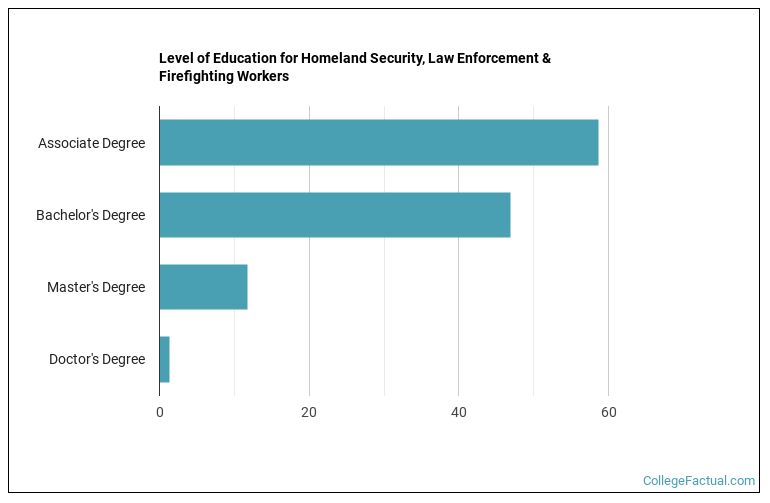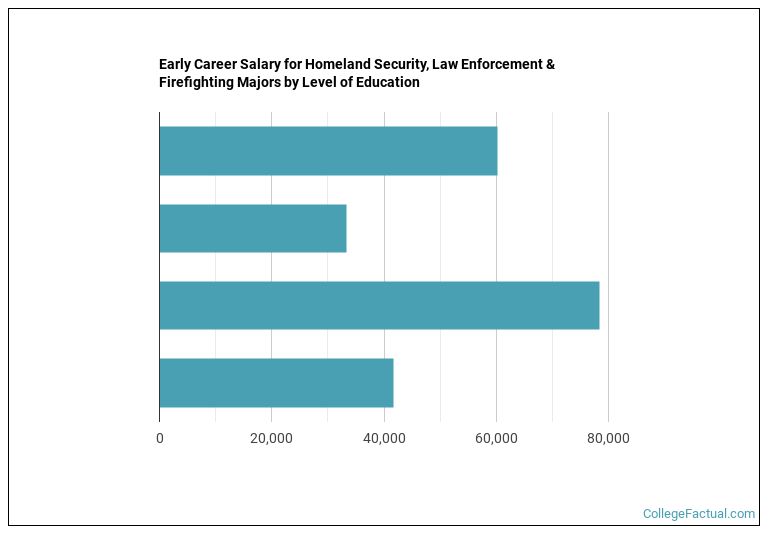 by our College Data Analytics Team
by our College Data Analytics TeamThe field of Homeland Security, Law Enforcement, and Firefighting is an important one and has been in high demand since the 9/11 terrorist attacks. This field allows you to be trained in a variety of national defense areas, preparing you for work protecting your country and fellow citizens.
There are a few different majors you can pursue in this field. Criminal Justice and Corrections will teach you about prison life, drug trafficking, and law, preparing you for work with criminals and the reformation system. A major in Fire Protection will provide training on preventing and stopping fires. You can also choose to major in Homeland Security in order to learn how to prevent and respond to threats and crisis internationally and domestically.
In 2021-2022, homeland security, law enforcement & firefighting was the 12th most popular major nationwide with 140,205 degrees awarded. Our 2025 Best Homeland Security, Law Enforcement & Firefighting Schools ranking analyzes 749 of these schools to determine the best overall colleges for homeland security, law enforcement & firefighting students. Explore this or one of our many other custom homeland security, law enforcement & firefighting rankings further below.
Leadership skills will help you during your training and in a future career. In a time of crisis, citizens will count on you to keep them safe. You must be able to respond quickly and appropriately in emergency situations and thrive when under. Interpersonal skills will help you work with all types of people of different ages and backgrounds. Be ready to listen to the concerns and advice of others, and also be able to explain laws and policies.
Most of the classes in this field are centered on science, math, government and law. Students should be comfortable with their math and science skills and ready to discuss potentially controversial subjects in the classroom. This rigorous major may also include physical training to prepare you to react in dangerous situations.
New students will need to have completed high school or a GED program and each school will have their own minimum GPA and SAT/ACT test requirements. In addition to these basic homeland security, law enforcement & firefighting program qualifications, to serve in some homeland security, law enforcement & firefighting careers, special certification may be required outside of your degree.
There are various different levels of homeland security, law enforcement & firefighting degrees. You can spend many years getting as high as a in homeland security, law enforcement & firefighting to something that takes less time like a . Different homeland security, law enforcement & firefighting degrees vary in how long they take.
| Degree | Credit Requirements | Typical Program Length |
|---|---|---|
| Associate Degree | 60-70 credits | 2 years |
| Bachelor’s Degree | 120 credits | 4 years |
| Master’s Degree | 50-70 credits | 1-3 years |
| Doctorate | Program required coursework including thesis or dissertation | At least 4 years |
A bachelor's degree is the most common level of education achieved by those in careers related to homeland security, law enforcement & firefighting, with approximately 32.7% of workers getting one. Find out other typical degree levels for homeland security, law enforcement & firefighting workers below.
| Level of Education | Percentage of Workers |
|---|---|
| Bachelor’s Degree | 29.6% |
| High School Diploma | 23.1% |
| Some College Courses | 12.9% |
| Associate’s Degree (or other 2-year degree) | 12.4% |
| Post-Secondary Certificate | 10.1% |
58.6% of homeland security, law enforcement & firefighting workers have at least a associate. See the chart below for the most common degree level workers in homeland security, law enforcement & firefighting have received.

The education level required is different depending on the homeland security, law enforcement & firefighting career you are seeking.
Depending on your major focus, you will be able to work in numerous fields. Graduates find work in fields like fraud detection, medicine, human resources, civil rights, intelligence, science and technology, facilities, and procurement. You will also be prepared for law enforcement careers in the areas of border security, head of state, protection of the President, interagency law enforcement training, and infrastructure security. If interested in prevention and response careers, you can find jobs protecting the public and the environment as a U.S. Coast Guard member or firefighter. Some career choices may require additional education or training.
Want a job when you graduate with your homeland security, law enforcement & firefighting degree? Homeland Security, Law Enforcement & Firefighting careers are expected to grow 7.7% between 2016 and 2026.
The following options are some of the most in-demand careers related to homeland security, law enforcement & firefighting.
| Occupation Name | Projected Jobs | Expected Growth |
|---|---|---|
| Accountants and Auditors | 1,537,600 | 10.0% |
| Managers | 1,071,700 | 8.0% |
| Police and Sheriff’s Patrol Officers | 731,900 | 7.0% |
| Correctional Officers and Jailers | 415,500 | -7.7% |
| Child, Family, and School Social Workers | 362,600 | 14.2% |
Homeland Security, Law Enforcement & Firefighting graduates between <nil> reported earning an average of $41,756 in the <nil> timeframe. Earnings can range from as low as $5,087 to as high as $165,273. As you might expect, salaries for homeland security, law enforcement & firefighting graduates vary depending on the level of education that was acquired.

Salaries for homeland security, law enforcement & firefighting graduates can vary widely by the occupation you choose as well. The following table shows the top highest paying careers homeland security, law enforcement & firefighting grads often go into.
| Occupation Name | Median Average Salary |
|---|---|
| Managers | $115,590 |
| Information Security Analysts | $102,470 |
| Computer Workers | $93,350 |
| Police and Detective Supervisors | $93,100 |
| Financial Examiners | $90,310 |
With over 7,372 different homeland security, law enforcement & firefighting degree programs to choose from, finding the best fit for you can be a challenge. Fortunately you have come to the right place. We have analyzed all of these schools to come up with hundreds of unbiased homeland security, law enforcement & firefighting school rankings to help you with this.
| Major | Annual Graduates |
|---|---|
| Criminal Justice & Corrections | 109,996 |
| Fire Protection | 13,901 |
| Security Science and Technology | 7,884 |
| Homeland Security | 6,812 |
| Other Homeland Security | 1,612 |
View All Homeland Security, Law Enforcement & Firefighting Related Majors >
| Related Major | Annual Graduates |
|---|---|
| Legal Professions | 67,032 |
View All Homeland Security, Law Enforcement & Firefighting Related Majors >
Image Credit: By Barry Bahler under License More about our data sources and methodologies.